Free time activities
| Website: | Herzlich willkommen auf der Seite der QUA-LiS NRW |
| Kurs: | [Q23] Hobbies |
| Buch: | Free time activities |
| Gedruckt von: | Gast |
| Datum: | Sonntag, 18. Januar 2026 |
Beschreibung
Inhaltsverzeichnis
- 1. Vocabulary - Free time activities
- 2. Creative task 1 - pictures
- 3. Creative task 2 - favourite sport *
- 4. Grammar - Simple past
- 4.1. Gap text
- 4.2. Gap text *
- 4.3. Write sentences - Regular verbs
- 4.4. Irregular verbs
- 4.5. Find the pairs
- 4.6. Fill in - Irregular verbs
- 4.7. Fill in * - Past forms
- 4.8. Multiple choice - Positive and negative statements
- 4.9. Multiple choice * - Positive and negative statements
- 4.10. Make sentences - negative statements
- 5. Grammar - Simple past (questions)
- 6. Creative task 3 - Last holidays
- 7. Vocabulary list - Weather
- 8. Pictures - Akira's weekend
- 9. Reading - Nina's postcard
- 10. Creative task 4 - postcard *
1. Vocabulary - Free time activities
| Picture | English | German | In context | Notes |
|---|---|---|---|---|
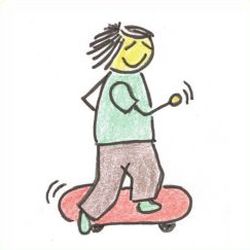 |
to go skateboarding |
Skateboard fahren | Akira likes to go skateboarding with his friends. | Write something that helps you to learn. |
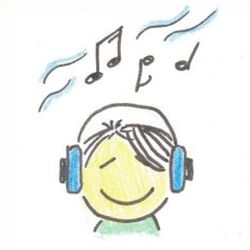 |
to listen to music |
Musik hören | In the evening Akira listens to his favourite music. | |
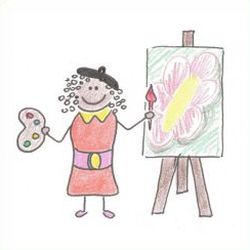 |
to paint pictures |
Bilder malen (mit Pinsel und Farbe) | Every Sunday Joyce paints pictures in the park. | |
 |
to draw |
zeichnen (mit Bleistift oder Buntstiften) | After school she sometimes draws pictures. | |
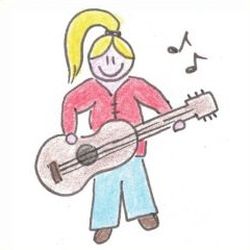 |
to play the guitar |
Gitarre spielen | Nina plays the guitar in the school band. | |
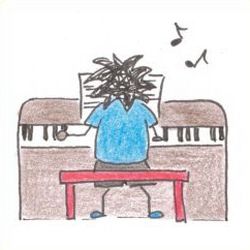 |
to play the piano |
Klavier spielen | Noah likes to play the piano. | |
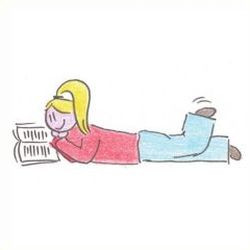 |
to read a book |
ein Buch lesen | Nina reads a book in the evening. | |
 |
to sing |
singen | The children sing a song. | |
 |
to swim |
schwimmen | Joyce swims in the sea. | |
| to chat with a friend |
mit einer Freundin / einem Freund chatten | Noah chats with his friends every Sunday. | ||
| to dance |
tanzen | Joyce dances with Akira. | ||
| to go for a walk |
spazieren gehen | They go for a walk in the park. | ||
| to play computer games |
Computerspiele spielen | The children play computer games in the evening. | ||
| to play football |
Fußball spielen | Nina and Noah play football at school. | ||
| to play table tennis |
Tischtennis spielen | The boys play table tennis at home. | ||
| to take photos |
Fotos machen | Joyce takes nice photos. |
1.1. Dialogue cards
1.2. Flashcards
1.3. Word grid
learningapps.org: Cookies
1.4. Crossword
learningapps.org: Cookies
1.5. Dictation
1.6. Find the pairs *
learningapps.org: Cookies
1.7. Paraphrasing (optional)
Paraphrase* three words from this lesson in the dictionary.
Follow these steps:
Step 1: Read two or three entries in the dictionary as an example.
Step 2: Find words that belong to the topic and that are not yet in the dictionary.
Step 3: Create a new entry in the dictionary in the category "At home".
Step 4: Write the word and its German translation in the title.
Step 5: Paraphrase* the word in the dictionary.
Step 6: Write an example sentence with the word.
Extra-Step (creative): If you want, you can add a picture to your entry. You can draw something or take a picture.
Watch the tutorial if you need help.
* "Paraphrasing" means that you explain the vocabulary in your own words for someone who doesn't know it, e.g. "A sneaker is a shoe that you wear for sports."
Erkläre drei Wörter aus dieser Lektion für das "dictionary".
Führe folgende Schritte aus:
Schritt 1: Lies zwei oder drei Einträge im "dictionary" als Beispiel.
Schritt 2: Finde Wörter, die zum Thema gehören, aber noch nicht im "dictionary" stehen.
Schritt 3: Erstelle einen neuen Eintrag für die Kategorie "At home".
Schritt 4: Schreibe das englische Wort und die deutsche Übersetzung in den Titel.
Schritt 5: Erkläre das Wort im "dictionary".
Schritt 6: Schreibe einen Beispielsatz mit dem Wort.
Extra-Schritt (kreativ): Wenn du möchtest, kannst du ein Bild ergänzen. Du kannst etwas zeichnen oder ein Foto machen.
Schau dir das Tutorial an, wenn du Hilfe benötigst.
2. Creative task 1 - pictures
Draw pictures of three further sports activities and upload them into the Hobbies-WIKI. Find the correct English words on the internet or in a dictionary and write them under the pictures.
Zeichne Bilder von drei weiteren sportlichen Aktivitäten und lade diese in das Hobbies-WIKI hoch. Finde die richtigen englischen Wörter im Internet oder in einem Wörterbuch und schreibe sie unter die Bilder.
3. Creative task 2 - favourite sport *
Write a text about your favourite sport into the Hobbies-WIKI. There you also find an example.
Try to answer the following questions:
Schreibe einen Text über deinen Lieblingssport ins Hobbies-WIKI. Dort findest du auch ein Beispiel.
Versuche, die folgenden Fragen zu beantworten:
- What is the sport called?
- Do you practice it alone or in a team?
- How many people are in the team?
- Do you need special clothes?
- Why do you like the sport?
4. Grammar - Simple past
Simple Past (einfache Vergangenheit)
📝 rule (Regel):
You need the simple past to say what happened in the past (yesterday, last weekend, ...). In German we prefer the perfect tense for this.
Mit dem Simple Past kannst du sagen, was jemand in der Vergangenheit getan hat. Im Deutschen bevorzugen wir das Perfekt dafür.
💡 form (Form):
1. regular verbs (regelmäßige Verben)
You add an ~ed to the verb.
Du hängst an das Verb die Endung ~ed.
| verb | + ed |
✏️ example:
| singular | |
|---|---|
| Yesterday I watched TV. |
Gestern habe ich Fernsehen geguckt. |
| You learned English last Friday. | Letzten Freitag hast du Englisch gelernt. |
| Last weekend he played football. | Letztes Wochenende hat er Fußball gespielt. |
| Last Saturday she painted a picture. | Letzten Samstag hat sie ein Bild gemalt. |
| Last week a squirrel (it) watched Joyce. | Letzte Woche hat ein Eichhörnchen (es) Joyce beobachtet. |
| plural | |
| Yesterday we learned English. | Gestern haben wir Englisch gelernt. |
| Last weekend you played football. | Letztes Wochenende habt ihr Fußball gespielt. |
| Last Monday they talked about music. | Letzten Montag haben sie über Musik gesprochen. |
2. irregular Verbs (unregelmäßige Verben)
You must learn the simple past form of these verbs by heart. You can find some of the irregular past forms in chapter 4.4. "Irregular verbs" here and in your students' book.
Du musst die Vergangenheitsform des Verbs auswendig lernen. Du findest einige Vergangenheitsformen im Kapitel 4.4. "Irregular Verbs" hier und in deinem Schulbuch.
✏️ example:
| singular | |
|---|---|
| Yesterday I read a book. | Gestern habe ich ein Buch gelesen. |
| You went to the park last Friday. | Letzten Freitag bist du in den Park gegangen. |
| Last weekend he swam in the lake. | Letztes Wochenende ist er im See geschwommen. |
| Last Saturday she drew a picture. | Letzten Samstag hat sie ein Bild gemalt. |
| Last week a squirrel (it) saw Joyce. | Letzte Woche hat ein Eichhörnchen (es) Joyce gesehen. |
| plural | |
| Yesterday we made music. | Gestern haben wir Musik gemacht. |
| Last weekend you did your homework. | Letztes Wochenende habt ihr eure Hausaufgaben gemacht. |
| Last Monday they went to the park. | Letzten Montag sind sie in den Park gegangen. |
⚠️ attention (Achtung)
Bei regelmäßigen Verben, die auf ~e enden, wird nur ein ~d angehängt.
| to like | → I liked it. | Ich habe es gemocht. |
| to dance | → She danced. | Sie hat getanzt. |
When there is a short vowel and a consonant at the end of the verb, you must double the consonant in front of the ~ed.
Bei Verben mit einem kurzen Vokal und einem Konsonanten am Ende, wird der Konsonant vor dem ~ed verdoppelt.
| to chat | → I chatted. |
| to stop | → I stopped. |
📌 remember! (Merke dir!)
The verb to be has two past forms: was (→ he, she, it) and were (→I, you, we, they).
Das Verb to be hat zwei Vergangenheitsformen: was (→ he, she, it) und were (→I, you, we, they).
💥 signal words (Signalwörter):
yesterday, an hour / two days / ... ago, last week / Monday / year / ...
3. negative statements (Verneinung)
For negative statements you put the auxiliary verb didn't in front of the main verb (infinitive).
Bei der Verneinung wird das Hilfsverb didn't vor das Hauptverb (Infinitiv) gestellt.
| I danced. | → I didn't dance. | Ich habe nicht getanzt. |
| He swam. | → He didn't swim. | Er ist nicht geschwommen. |
4.1. Gap text
learningapps.org: Cookies
4.2. Gap text *
learningapps.org: Cookies
4.3. Write sentences - Regular verbs
example: Akira and Noah played table tennis.
learningapps.org: Cookies
4.4. Irregular verbs
Here you find a list of some irregular verbs.
Hier findest du eine Liste einiger unregelmäßigen Verben.
| infinitive | simple past | German | note |
|---|---|---|---|
| to go |
went |
gehen | Write something that helps you to learn. |
| to read |
read |
lesen | |
| to sing |
sang |
singen | |
| to swim |
swam |
schwimmen | |
| to take |
took |
nehmen | |
| to draw |
drew |
zeichnen | |
| to do |
did |
tun | |
| to see |
saw |
sehen | |
| to make |
made |
machen |
> List of irregular verbs download (Liste der unregelmäßigen Verben zum Download) 213 KB
4.5. Find the pairs
learningapps.org: Cookies
4.6. Fill in - Irregular verbs
learningapps.org: Cookies
4.7. Fill in * - Past forms
learningapps.org: Cookies
4.8. Multiple choice - Positive and negative statements
learningapps.org: Cookies
4.9. Multiple choice * - Positive and negative statements
learningapps.org: Cookies
4.10. Make sentences - negative statements
learningapps.org: Cookies
5. Grammar - Simple past (questions)
simple past - questions (einfache Vergangenheit - Fragen)
1. yes-no questions (Ja / Nein-Fragen):
For questions you put the auxiliary verb did at the beginning of the question. The main verb takes the infinitive form. You also need the auxiliary verb for the short answers.
Bei Fragen wird das Hilfsverb did an den Anfang der Frage gestellt. Das Hauptverb nimmt dann wieder die Infinitiv-Form an. Du brauchst das Hilfsverb auch bei den Kurzantworten.
| singular | |
|---|---|
| Did I read a book? | Yes, you did. / No, you didn't. |
| Did you go to the park? | Yes, I did. / No, I didn't. |
| Did he swim in the lake? | Yes, he did. / No, he didn't. |
| Did she draw a picture? | Yes, she did. / No, she didn't. |
| Did a squirrel (it) see Joyce? | Yes, it did. / No, it didn't. |
| plural | |
| Did we make music? | Yes, we did. / No, we didn't. |
| Did you do your homework? | Yes, we did. / No, we didn't. |
| Did they go to the park. | Yes, they did. / No, they didn't. |
2. wh-questions (W-Fragen):
You put the question word (who, where, what, why, when) at the beginning of the question when you want to ask for more information.
Man setzt das Fragewort an den Anfang der Frage, um nach mehr Informationen zu fragen.
5.1. Find the pairs - yes-no questions
learningapps.org: Cookies
5.2. Multiple choice - Short answers
learningapps.org: Cookies
5.3. Give short answers *
learningapps.org: Cookies
5.4. Puzzle - Wh-questions
learningapps.org: Cookies
6. Creative task 3 - Last holidays
What did you and your family do in the last holidays? What didn't you do?
Choose one of the tasks and upload your results in the Hobbies-WIKI.
Was haben du und deine Familie in den letzten Ferien gemacht? Was habt ihr nicht gemacht?
Wähle eine der Aufgaben aus und lade deinen Text ins Hobbies-WIKI.
a) Write ten sentences about what you did and didn't do in the holidays (-> positve and negative statements).
Schreibe zehn Sätze darüber, was du in den Ferien (nicht) gemacht hast (Aussagesätze und Verneinungen).
or
b) Write ten questions for a partner: What did he / she do in the holidays? What didn't he / she do? (-> yes-no questions and wh-questions)
Schreibe für einen Partner / eine Partnerin zehn Fragen auf: Was hat er / sie (nicht) gemacht? (-> Ja / Nein-Fragen und W-Fragen)
7. Vocabulary list - Weather
| Picture | English | German | Notes |
|---|---|---|---|
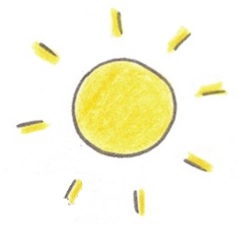 |
sunny |
sonnig | Write something that helps you to learn. |
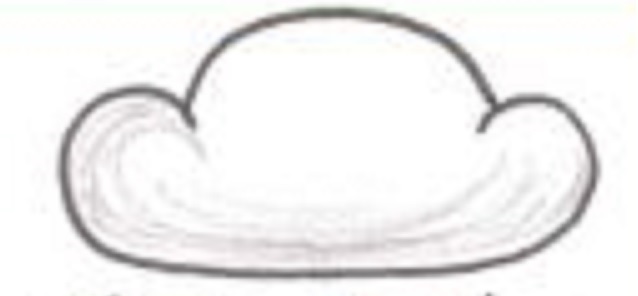 |
cloudy |
bewölkt | |
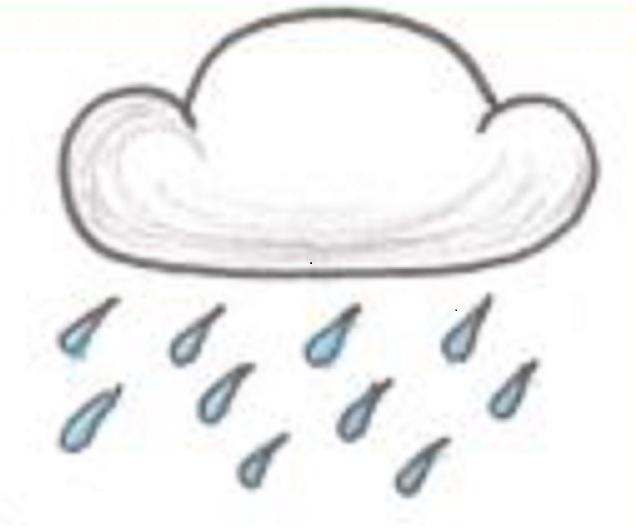 |
rainy |
regnerisch | |
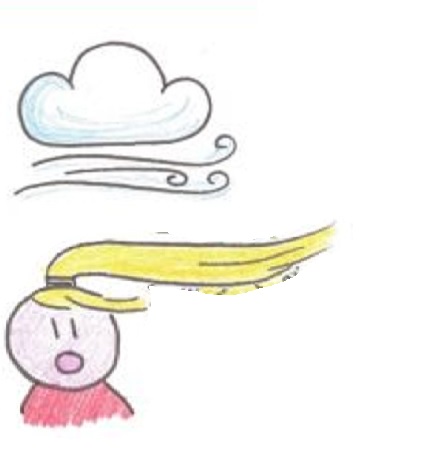 |
windy |
windig | |
 |
overcast |
bedeckt | |
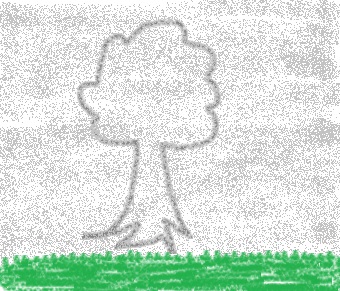 |
foggy |
nebelig | |
 |
snow |
Schnee | |
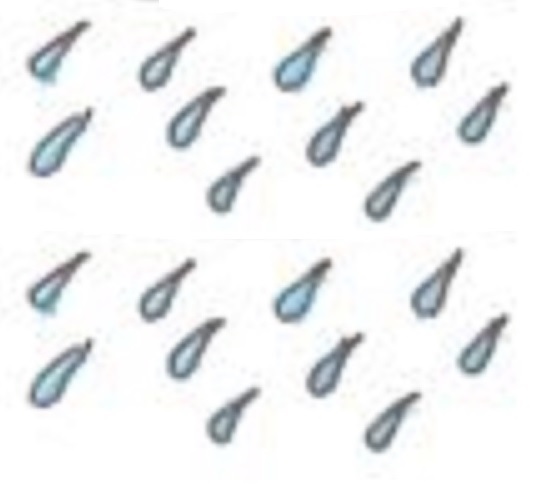 |
rain |
Regen | |
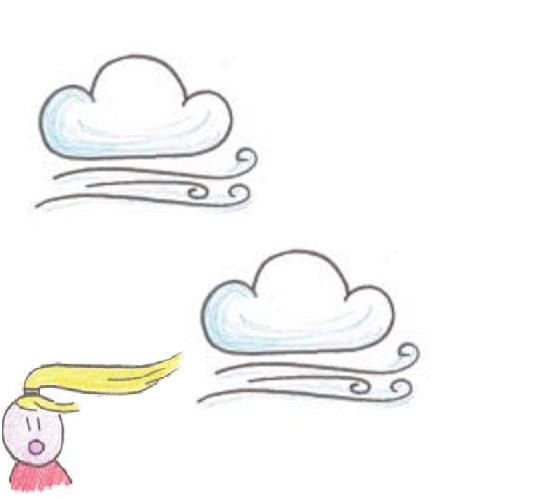 |
storm |
Sturm | |
 |
hot |
heiß | |
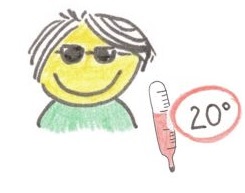 |
warm |
warm | |
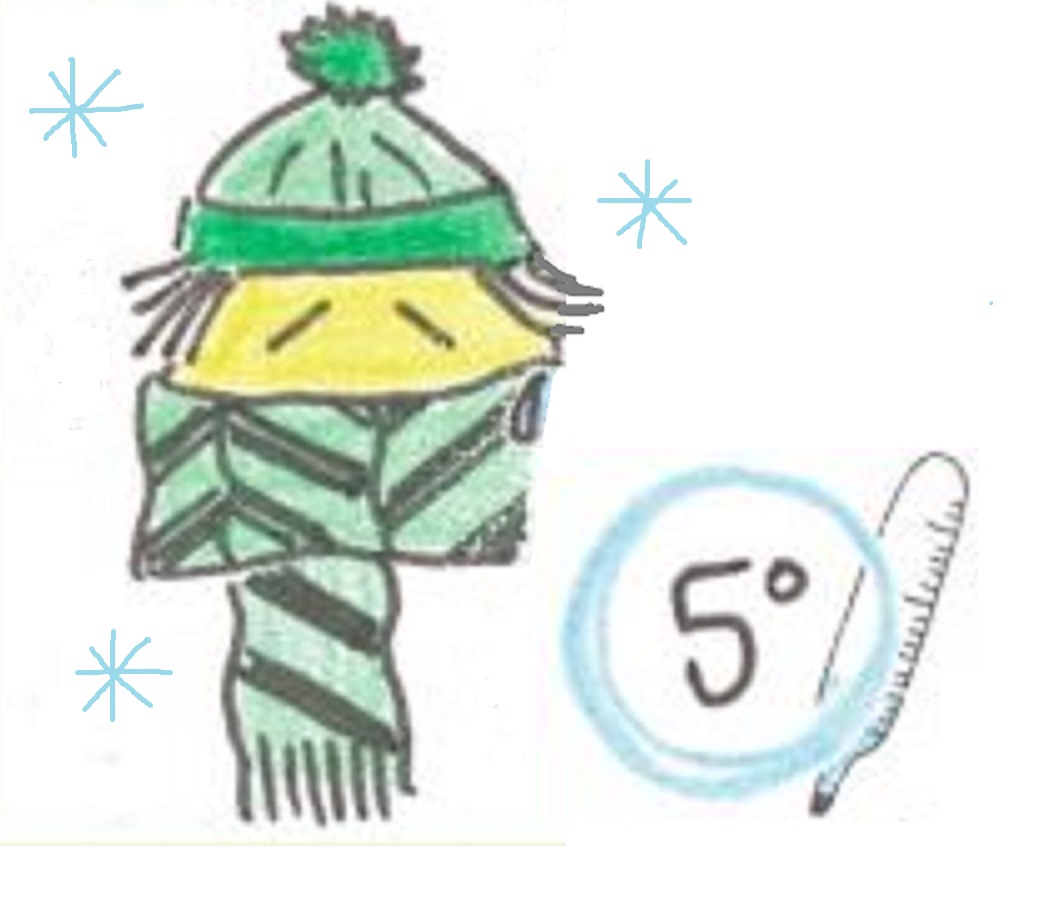 |
cold |
kalt |
7.1. Find the pairs
learningapps.org: Cookies
7.2. Gap text
learningapps.org: Cookies
8. Pictures - Akira's weekend
Read the text out loud and look at the pictures! You can check your reading with the audio.
Lies die Texte laut vor und schaue dir die Bilder an. Du kannst deine Aussprache mit Hilfe der Audio-Datei überprüfen.
"On Saturday it was cloudy. Nina read a book. Joyce took photos. Akira and Noah played table tennis. Noah won."
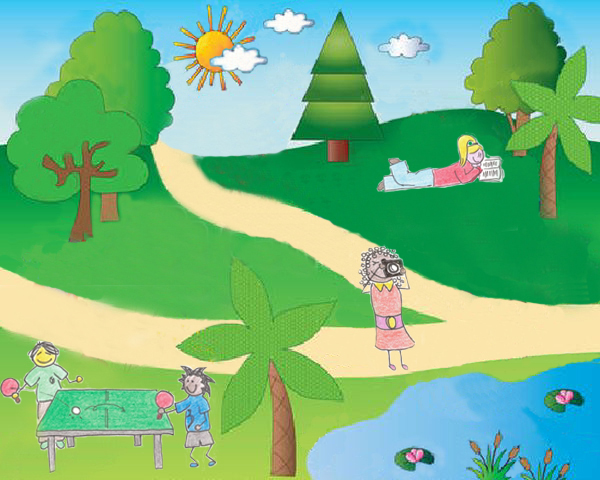
"On Sunday it was sunny. Nina and Noah played football. Akira went skateboarding. Joyce painted a picture. And the ducks? The ducks swam in the pond."
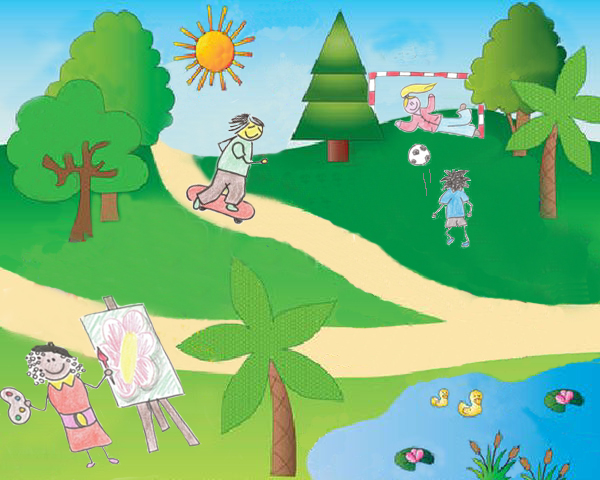
8.1. Multiple choice - Saturday
Last weekend the friends were in the park. What did they do?
Am letzten Wochenende waren die Freundinnen und Freunde im Park. Was haben sie gemacht?
On Saturday:
learningapps.org: Cookies
8.2. Multiple choice - Sunday
On Sunday:
learningapps.org: Cookies
8.3. Tell your partner - Akira's weekend (Saturday)
At the weekend, the friends went to the park.
What did they do? Talk to a partner about the pictures or write into your notebook.
Am Wochenende gingen die Freundinnen und Freunde in den Park.
Was haben sie gemacht? Sprich mit einer Partnerin oder einem Partner über die Bilder oder schreibe in dein Heft.
On Saturday ...

Where were the friends at the weekend?
They were ... .
What was the weather like?
It was cloudy / sunny / ...
What did they do?
They played table tennis.
They / Joyce / Akira and Noah / ...
(to) read - read
(to) take - took
(to) go - went
(to) win - won
On Sunday ...

It was fun / great / exciting/ ...
Was it exciting to play ...?
Yes, it was./ No, it wasn't
Did Nina play football?
Yes, she did. / No, she didn't.
Did Joyce swim?
Yes, ... . / No, ... .
Did ...?
Go on!
8.4. Ask your partner - Akira's weekend (Sunday)
At the weekend, the friends went to the park.
What did they do? Ask your partner yes-no questions about the pictures or write into your notebook. Your partner can answer the questions (short answers).
Am Wochenende sind die Freundinnen und Freunde in den Park gegangen.
Was haben sie gemacht? Stell einer Partnerin oder einem Partner W-Fragen zu den Bildern oder schreibe in dein Heft. Dein Partner oder deine Partnerin kann sie beantworten (Kurzantworten).
On Sunday ...

Was it exciting / boring / ... to play football / to ...?
Yes, it was. / No, it wasn't
Did Nina play football?
Yes, she did. / No, she didn't.
Did Joyce swim?
Yes, ... . / No, ... .
Did Noah and Nina ...?
...
Go on!
8.5. Gap text *
Look at the pictures again and fill in the missing words.
Schau dir die Bilder noch einmal an und ergänze die fehlenden Wörter.
 |
<- Saturday | Sunday -> |  |
|---|
learningapps.org: Cookies
9. Reading - Nina's postcard
1. Listen and read the text:
Here you can listen to the text:
Hier kannst du den Text anhören:
Read the text. Afterwards you have to decide, which pictures go with the story.
Lies dir die Postkarte durch. Nachher musst du entscheiden, welche Bilder dazu passen.
|
Dear Grandma, how are you? I hope you also had a nice weekend. Love, Nina |
9.1. Choose the right pictures
Two pictures don't belong to the story. Find the correct pictures and drag them to the empty boxes. You don't have to find the correct order.
Zwei Bilder gehören nicht zur Geschichte. Finde die richtigen Bilder und ziehe sie in die leeren Felder. Du musst nicht die richtige Reihenfolge finden.
9.2. Find the pairs
learningapps.org: Cookies
9.3. Text order
learningapps.org: Cookies
9.4. Find the mistakes
Read the text again. Can you find three mistakes?
Lies den Text noch einmal. Kannst du drei Fehler finden?
|
Hello Grandma, how are you? I hope you also has a nice weekend. Love, Nina |
10. Creative task 4 - postcard *
Write a postcard to someone in your family. Tell that person what you did last weekend. You may also draw a picture. Upload it in the Hobbies-WIKI. There you also find an example.
Schreibe eine Postkarte an jemanden aus deiner Familie. Berichte der Person, was du am letzten Wochenende gemacht hast. Du darfst auch ein Bild dazu zeichnen. Lade dein Ergebnis ins Hobbies-WIKI hoch. Dort findest du auch ein Beispiel.